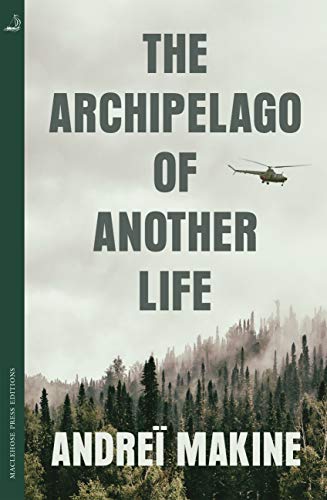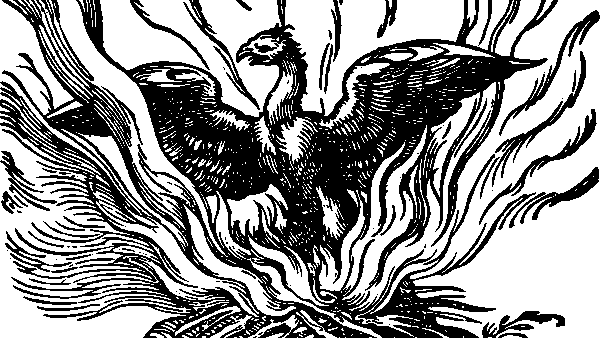I’m reading The Archipelago of Another Life by Andreï Makine in the company of Emma at Words and Peace and Carol at Cas d’Intérêt.
The novel is set in the bewitching wilderness of the Siberian “taiga”, a huge expanse of lake-studded forest on the far eastern edge of the old Soviet Union. It’s structured around a pursuit: a small band of soldiers pursuing a fugitive from a prison camp. But the story is much more than a simple chase. Out there in the wilderness, it becomes increasingly unclear who’s pursuing who, and who’s trying to escape from what.
These are my answers to Emma’s questions on the second quarter of The Archipelago of Another Life.
1) Starting with Chapter 2, we have a story within a story, with another man followed and tracked by others. How do you like the fact that the author is moving the zoom from the young narrator to Pavel? And do you think he is ever going to focus again on the teenager? How do you think this is going to evolve?
I love the way that the second pursuit starts to echo the first in so many ways. We start to see the young Pavel being fooled by the same tricks that he later (or earlier, in terms of the book!) uses as an older man to outwit his young pursuer.
Pavel and the initial narrator have a lot in common too—both soldiers, both alienated in some way from their lives and surroundings, both having good reasons to want to get away from everything and lose themselves in pursuit of someone else, or something else. And I like that both tales are told from the perspective of the pursuer, so there’s a sense of yearning or chasing after something, and yet the pursuers are in both cases also sympathetic towards their quarry, and are both also trying to escape themselves.
Since this whole section is a story that Pavel is telling to the initial narrator, I assume that we’ll return to him at the end to get his reaction and Pavel’s reflections. By using a frame like this, Makine removes some of the suspense from the tale—we know Pavel must survive to tell his story, so the dangers of the pursuit may claim other lives but not his. But I think Makine is happy to give up this suspense because that’s not his purpose. What he gains is the ability to take us beyond the pursuit and show it in the context of a later era and Pavel’s later perspective as an older, wiser man.
2) This second quarter of the book contains several comic scenes. Does this work for you? Why these comic elements according to you?
Overall, I found this section tense and nerve-wracking, not just because it’s a dangerous environment they’re in, but because of the fractures within the group that seem likely only to increase as the pressure of the chase and the wilderness take a further toll.
So I suppose the comic scenes are designed to offer some contrast or relief from that, but I think they’re also a commentary on the USSR or its military/bureaucratic/political structures as Makine saw them. The comedy mostly arises out of the authority figures being incompetent and bumbling and then blaming each other in ridiculous ways. They end up looking stupid, knowing they look stupid, and reacting by blaming their subordinates or behaving with even more brutality and rage. So I think he’s trying to point to the incompetence of the system, its inability to accept responsibility for its mistakes, and the fertile environment it provides for the development and career advancement of petty, bullying autocrats.
3) We see Pavel often alternating quickly between conflicting thoughts: wanting to save the fugitive and wanting to finally succeed in catching his prey. How do you explain that?
It’s amazing how quickly Pavel departs from the mission of pursuit and capture and begins to sympathise with the fugitive. Very early on, he sees a little bunch of yellow flowers left on a high branch, and he deliberately doesn’t report it:
“I caught up with the group and informed Luskas, ‘I’ve found nothing, Comrade Captain,’ secretly feeling that he and I were travelling on different roads.”
I think he very quickly starts to see himself in the fugitive. It’s like when you see someone doing something you secretly dream of but don’t have the courage to do yourself: you cheer them on, living vicariously through them. Pavel also respects the fugitive’s intelligence and use of clever ruses to keep outwitting them. Even in that early incident with the bunch of yellow flowers, he says he “detected a certain subtlety in it.” The way it was left was not obvious, but was visible to “someone who paused and looked upwards, embracing the brightness of the sky.” So I think there’s a respect and feeling of kinship there.
But supporting the fugitive is a subversive act, and in the USSR under Stalin, subversive acts are not undertaken lightly. So I think the conflicting thoughts are a sign of how strong the hold of the system is on people, and how tough it is to rebel against such a totalitarian system. Pavel is essentially trying to liberate himself, and with that process come certain relapses into the familiar state that he refers to as being a “rag doll”, identified with “caution, compromise, resignation.”
4) Boutov reveals that Louskass is pursued by his own past. This adds another dimension to the theme of the manhunt. Any thought on that, on a possible message the author is trying to convey?
This is one of the ways in which Makine broadens The Archipelago of Another Life out beyond being a simple story of a physical pursuit. It’s also a psychological pursuit, an existential story. After all, we are all involved in a pursuit of sorts: we pursue dreamed-of futures while being pursued by the mistakes of our past. So Makine is inviting us to see ourselves in the story and think about what we ourselves are pursuing and being pursued by.

5) Were you surprised by their “shocking discovery”? Had you correctly interpreted the signs? What was your reaction to the men’s thoughts and plans after their discovery?
OK, I can’t really answer this without giving a spoiler, and I’m quite cavalier about spoilers anyway. So if you do care about spoilers, look away now.
Have you looked away? Good, then I’ll proceed to tell you that the fugitive turns out to be a woman, and this changes the pursuers’ attitude completely. Right before that, they’d all been coming around to Pavel’s point of view, with even the more orthodox among them feeling sympathy for the man and respect for the way he’d evaded them.
But when they find a strip of cotton spotted with blood from the fugitive’s period, they are furious. She’s suddenly a “bitch”, a “filthy cow”, and the talk turns to how they’ll all rape her when they catch her. They could respect a man for evading them, but to be outsmarted by a woman? It makes them furious, and they plot their revenge in the most graphic and shocking terms.
I found it quite sickening and yet very believable: we live today amid an epidemic of male sexual violence towards women, and it was even worse 70 years ago. And for all its power to do harm, the male ego is extraordinarily fragile. These men are motivated not by sexual desire but by the humiliation they feel and the need to punish the woman, as Pavel puts it, “for having perverted the logic of this world.”
And yes, I was surprised by their discovery. It was the best kind of twist—I didn’t see it coming, but after it was revealed, I looked back and saw that there were little hints all along. So it was very nicely done.
6) Do you think the author does a good job at suspense so far?
As I said earlier, I don’t think suspense is Makine’s main intention in The Archipelago of Another Life, but yes, there is quite a bit of it. It’s just not the sort you’d expect: instead of being in suspense over whether they’ll catch the fugitive, I’ve mostly been more nervous about how the group of pursuers will fragment and who will betray whom.
The twist ups the stakes of the chase itself, though, and introduces a lot more suspense. Being captured in these circumstances would probably have been a death sentence anyway, but as a woman at the hands of a pack of angry men, the fugitive now faces a horrific ordeal. It’s likely she knows this, so will not allow herself to be captured alive. Considering how close they always seem to be to capturing her, it’s a very tense situation.
7) What do you think the author is trying to convey through these adventures? What surfaces for you?
In addition to what I’ve already mentioned, I think Makine is trying to convey how difficult it is to escape and be free in a society like the USSR under Stalin. It’s difficult for the fugitive, who is taking huge risks and is always just a single mistake away from being captured. But it’s also difficult for Pavel, who wants to be free but keeps getting dragged back into conditioned ways of thinking. And perhaps some of his comrades, too, want to escape in their own ways but are unable to do so.
And although The Archipelago of Another Life is set in the USSR and clearly has a lot to say about that society, I think Makine also wants us to think more broadly about escape and freedom, rebellion vs conformity, the difficulty of living a truly individual life beyond the confines of society—issues that exist in different ways in all forms of human community.
OK, that’s it for part 2 of this readalong of The Archipelago of Another Life. Part 3 will be in a couple of weeks. Feel free to join us for parts 3 and 4 if the book sounds interesting to you!




There are 8 comments
Wow, thanks so much for your awesome answers, I like how you help us the broader view here, at the more existential level. And also how you see more tension than suspense.
Thanks also for highlighting all the parallels between the two chases.
I’m going to add a link on my post, so our readers can also come and see your answers
Thanks Emma! I’m glad you liked my answers. I had intended to participate more fully in the readalong and do a post for each part, but I’ve been hit hard by a ton of work recently, and next week I’m taking a week off from the internet, so I think I’ll have to miss part 3 and catch up again with part 4. Sorry about that! Thanks for the link 🙂
I don’t think I’ve heard of this book, but somehow I thought it would be super long if it was part of a RAL? That likely says more about me than it does about any book..that I need someone to hold my hand when it comes to looooong books. LOL
The aspect of your discussion above that I find particularly intriguing (also, even though I haven’t heard of it, I still appreciated the spoiler warning) is the idea of the outcome being known (so suspense isn’t the primary concern for the writer) but, even so, that the author manages to create tension within the segments. Not easy to manage all those layers and keep things humming along.
No, it’s pretty much regular length—at least I think so. Reading on Kindle leaves me with less sense of length than when I’m hefting a hardback, but it didn’t feel long. I think Emma and Carol just wanted to analyse the book in more detail.
Yes, Makine does a great job of keeping the tension going. The outcome is not completely known—there’s plenty of stuff to keep you guessing—but yes, I think suspense is not his main aim. I think he’s trying to talk about the journey of life and the difficulty of breaking free from the past, and the “will they or won’t they catch up with the fugitive?” aspect is only part of it. It does help to keep things humming along, though!
The main reason I wanted to read a shorter novel is because Emma and I are reading in French. Our posts are also in French and English. As this is not my native language, I didn’t want to over commit. It’s been a fun challenge.
That makes sense, Carol. I’m always wary of over-committing to blogging projects, even in my own language, so I can definitely see your point 🙂
Wonderful analysis Andrew. Sorry it took me a while to find this. I’ve been swamped so Part IV may be later than initially intended. My current plan is to have it out by Friday, June 4. So, there may be time for you to write about Part III.
No worries, Carol – I’ve been swamped too! It always seems to happen this way: I sign up for a readalong when things are good and I have lots of time, and then everything gets so busy as soon as it starts! I see your Part IV is live now, so I’ll check it out. Thanks for organising this – I’ve enjoyed it.